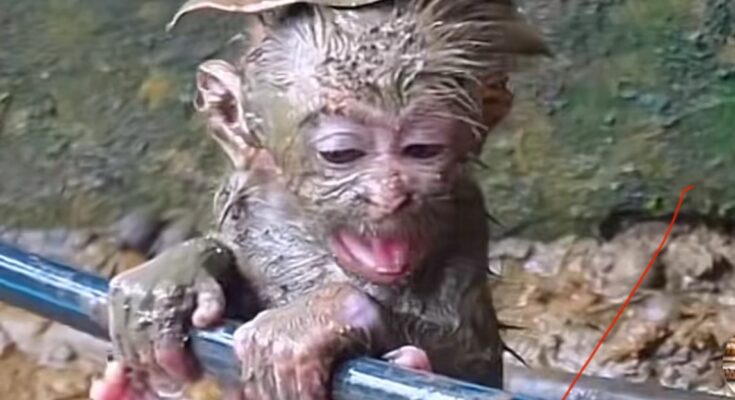In the dense forests and tropical habitats where monkey troops thrive, baby monkeys are often seen playing, climbing, and exploring their environment. One of the more curious behaviors observed in some monkey species is the tendency of baby monkeys to spend long periods of time wallowing in or playing with mud. While this activity might seem harmless or even adorable, new research suggests that prolonged exposure to muddy environments may increase the risk of germ transmission—not only to the infants themselves but also to others in their group.
The Hidden Risks of Mud Play
Mud is a natural element in many primate habitats, especially in rainy or humid regions. It serves several purposes in the animal kingdom—cooling the body, soothing skin irritations, and even deterring parasites. However, mud can also be a breeding ground for harmful bacteria, parasites, and viruses, especially in areas contaminated with feces or stagnant water.
When baby monkeys stay in the mud for extended periods, they risk picking up harmful microorganisms on their hands, feet, and fur. Since young monkeys are still developing their immune systems, they are more susceptible to infections. But the risk doesn’t end with them.
Germ Transmission Within Troops
Monkeys are social creatures, and baby monkeys frequently engage in grooming, play, and feeding with others in their troop. This close contact provides ample opportunity for germs to spread. A baby monkey that has been exposed to contaminated mud can unknowingly become a carrier of pathogens. Through grooming or touch, these germs can then transfer to siblings, parents, or even higher-ranking adults in the troop.
Moreover, some of the diseases that can be transmitted in this way include skin infections, intestinal parasites, and respiratory illnesses. In certain cases, these diseases can weaken the entire troop, leading to lower survival rates and reduced reproductive success.
Environmental and Behavioral Factors
The likelihood of disease transmission is influenced by several factors. For instance:
-
Habitat Quality: In areas where human activity has led to polluted water sources or deforestation, mud patches are more likely to harbor dangerous pathogens.
-
Troop Size: Larger groups mean more opportunities for contact and thus a higher chance of spreading disease.
-
Parental Supervision: Some adult monkeys discourage infants from prolonged mud exposure, possibly as an instinctive protective behavior.
Researchers have also noted that in some species, older monkeys seem to avoid individuals who are excessively dirty or covered in mud, indicating a possible natural awareness of hygiene and disease risk.
The Conservation Perspective
Understanding how behaviors like mud play contribute to disease spread is vital for wildlife conservation and primate health. In sanctuaries and rehabilitation centers, caretakers now pay closer attention to environmental hygiene and infant monkey behavior. Preventing disease outbreaks in these controlled environments helps ensure the long-term survival and reintroduction of endangered primates.
Conclusion
While baby monkeys playing in the mud might look like innocent fun, there’s a hidden danger beneath the surface. Prolonged exposure to contaminated mud can lead to germ transmission and disease outbreaks within monkey troops. Recognizing and addressing these risks is essential—not only for the health of individual animals but also for the conservation of entire species.



